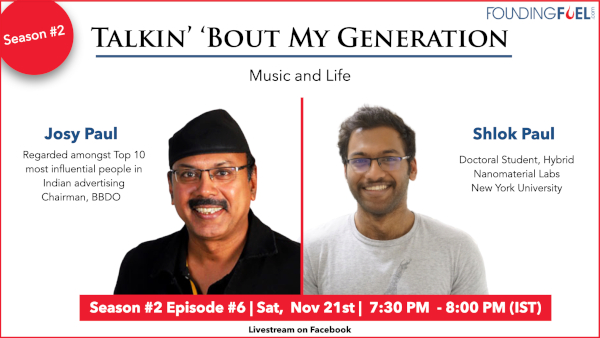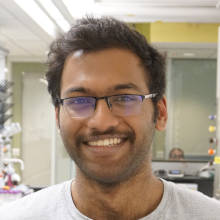[Image by Free-Photos from Pixabay]
By Shlok Paul and Josy Paul
My journey with music began since the time I was in my mother’s womb. My mother used to tell me how it was a very tough nine months for her, and how she would find hope by singing an old gospel song ‘one day at a time’. It gave her the energy to carry on.
I’m only human, I'm just a woman
Help me believe in what I could be
And all that I am
Show me the stairway, I have to climb
Lord for my sake, teach me to take
One day at a time
The crazy thing is that when I was born, and when she would sing ‘one day at a time’, I would start to cry. It was like I knew what my mother had been through. Empathy is a mysterious memory structure that music is made of. My mom used to say that we were connected by the umbilical cord of songs.
Some of the strongest memories of my childhood revolve around my mother’s rehearsals at the various churches and auditoriums in Bandra, Mumbai. She would let me tag along. The rules were simple: if I didn’t disturb the choir during their hour-long hymns I’d receive as compensation a baked goodie of my liking. At the time I didn’t think much of these nightly rituals, obviously lost in my greed for junk food. But looking back it was my first insight into how music can shape communities.
The memory of these communal hymns came back to me when I watched the people of Paris sing into the streets as the historic Notre Dame Cathedral was engulfed in flames. It reflected a communal reassurance that despite losing an icon of their rich past their community would continue. I’m grateful to have realized this embracing and warming power of music, especially in the moment of extreme isolation with which we are forced to live in now.
For my mother, music wasn’t an end in itself. It was a doorway to impact communities. Music helped her build a network of connections with other musicians and social activists. It led to her singing at non-profit fundraisers like Kripa Foundation and Celebrate Bandra. And from there to a lead role in a French opera with Muzaffar Ali. She even opened the show for Abida Parveen.
My mother then took charge of the ALM (area local management), mobilized local action including saving a neighbourhood park and converting it into a community farm where she and her many volunteers grow different species of trees, shrubs, flowers, fruits and vegetables, right here in the middle of this concrete environment. They’ve already successfully grown beans, pineapples, bananas, elephant bhindi, red bhindi, purple winged bean, bitter gourd and much more.
My mom’s community service inspired me to do my bit. I joined an action group called Haiyya, an initiative to encourage collective action to make Bandra a safer place. At that time, I also developed a low-cost way to test blood for Thalassemia. I was invited to speak at TEDx. All this because of my mother’s passion and talent for singing for change.
Tired of lying in the sunshine staying home to watch the rain.
You are young and life is long and there is time to kill today.
And then one day you find ten years have got behind you.
No one told you when to run, you missed the starting gun.
During my growing up years, I was also exposed to a different kind of music. I would wake up and without fail, hear the slow melodic opening of David Gilmour’s guitar solo coming from the floor upstairs (my dad’s study) followed by the eager call 10 minutes and 32 seconds later for me to “Shine on you crazy diamond”. At the time I had no idea it was a song signalling the departure of a mentally declining Syd Barrett, his isolation.
Talking about isolation, the pandemic and social isolation has brought my family together. My sporadic calls to my parents and grandparents have become nightly events. Simple things like the sounds of the birds returning to my grandmother’s apartment complex. It takes me back to the sounds of her environment when I was much younger.
I also call my parents around the time that they do their daily walking ritual on our terrace with background music provided by the non-commercial radio station: Radio Paradise.
Come gather ’round people
Wherever you roam
And admit that the waters
Around you have grown
And accept it that soon
You’ll be drenched to the bone
If your time to you
Is worth savin’
Then you better start swimmin’
Or you’ll sink like a stone
For the times they are a-changin’
The same song became the mantra of my closest friends group in high school. Shine on you Crazy Diamond played every morning on our many trips to Goa. High school would become the place where there was a strong osmosis of musical tastes—I started to drift from my seemingly broody rock roots to become more accepting of the sounds of the ongoing rave epidemic in India. The music of movement, community, touch and togetherness.
It’s these memories that I get back now as I attend Cercles free online DJ sets during the pandemic from the most scenic parts of the world, all from the comfort of my apartment in New York. It makes sense that in a time when we’re most restricted in movement the mind would gravitate back to the sounds of freedom and dance.
Haven’t you heard it’s a battle of words
The poster bearer cried
“Listen son”, said the man with the gun
There’s room for you inside
I took quickly to cycling around the city as lockdowns settled in and gyms were closed. Cycling and listening to new music was my modern way of cycling the old jukebox—you never know when you’ll find a gem that matches your cadence. One Saturday long after the cheers, clangs and claps that wash over the city at 7 pm for all the necessary workers of the city, I was cycling around Central Park listening to Kendrick Lamar’s ‘Money Trees’ when I noticed the song getting louder and louder. This was no glitch in my earphones. Instead, I was hearing a car with its speakers blasting the song past any legal limit. I biked away feeling fellowship with whoever was in that car and everyone on the street that heard the same thing. It was the closest I’d been to a concert since the shutdown. A pseudo-collective outdoor listen. This is the kind of crowd culture we seem to have left to enjoy during isolation. With concert halls and churches closed it is not surprising that isolation-friendly mediums like twitch music streamers, YouTube collective lo-fi sets and your local neighbourhood balcony trumpet player are emerging strong.
Look at the weak and cry, pray one day you’ll be strong
Fighting for your rights, even when you’re wrong
And hope that at least one of you sing about me when I’m gone
Am I worth it?
Did I put enough work in?
If you’ve made it this far into the article and are disciplined enough to follow the lore of this TAMG episode, you must be asking, “Why in the hell is a non-musician yapping on about his time with music?” It’s a great question. Really it’s about exposing this common joy between my Dad and I. As a scientist I am far removed from his world of creative advertising and he is far removed from my study of soft matter physics. Still I can share with him a video of Richard Feynman playing the bongos and he can share with me the many ad jingles incorporated into his work. We can comprehend it and share how it made us feel.
And you can keep your symbols of success
Then I’ll pursue my own happiness
And you can keep your clocks and routines
Then I’ll go mend all my shattered dreams
Maybe today, yeah
I’ll slip away
Hopefully and quite likely, it is a common joy between you and I. But perhaps why I most want to talk about music is because of how much I regret not playing my bass guitar when I can. Scientists have had strong affairs with music. Einstein’s second wife Elsa tells the story of him disappearing one day totally lost in thought to a piano which he plays furiously while making notes. The story continues that he emerged from that piano session with a draft of the theory of general relativity. It is true that playing an instrument and the associated ambulatory processes seem to have the same effect that movement/walking have on many people and I do regret not having that outlet. It gets the creative juices flowing. Just ask Lil Pump who conjured up the lyrical genius below:
Gucci gang, Gucci gang, Gucci gang (Gucci gang!)
Gucci gang, Gucci gang, Gucci gang, Gucci gang
Gucci gang, Gucci gang, Gucci gang (Gucci gang!)
“Music is not just music, it’s also the associations that go with it”: Josy Paul
“During the lockdown, I spent three months just walking round and round on our small terrace. Each day, I used to choose a theme from my past and play the songs that fit the theme. It was a walk back, a flashback! All the things in my life associated with the music would walk with me. I was a DJ walking on memory lane. Music gave me hope and power. I believe the only way to fight our Covid blues is with our inner rock n roll,” says Josy Paul.
Listen to him as he recalls stories about how he was introduced to the influential power of music, how friendships and even love blossomed around music, and how it fuelled him to find his own purpose.
Join Shlok and Josy on Saturday November 21, at 7.30 pm, for Season 2, Episode 6, of Talkin’ Bout My Generation.

If you haven’t registered to watch the show already, register here: https://bit.ly/FFTAMG

